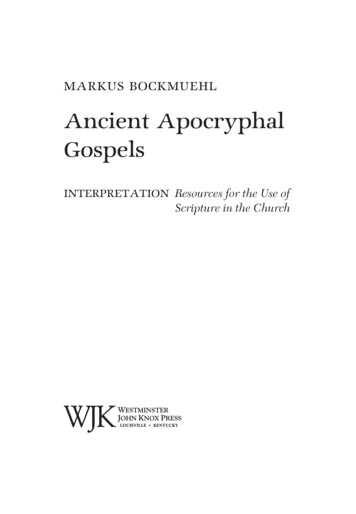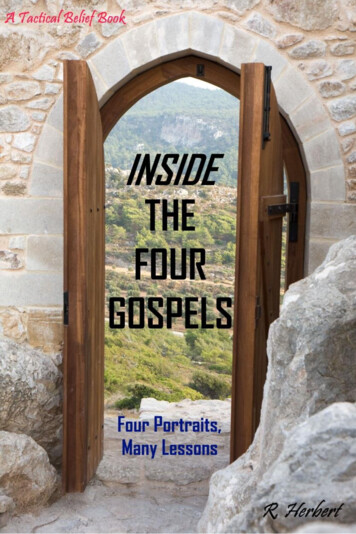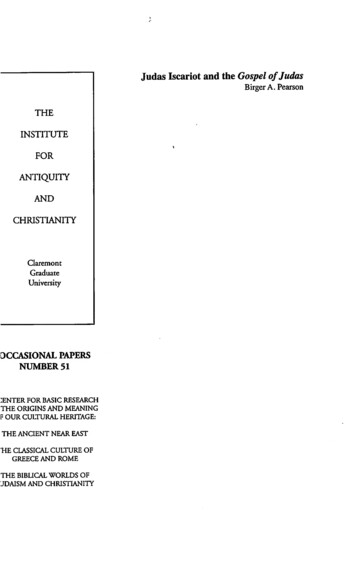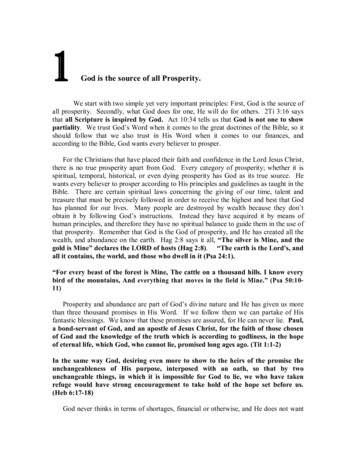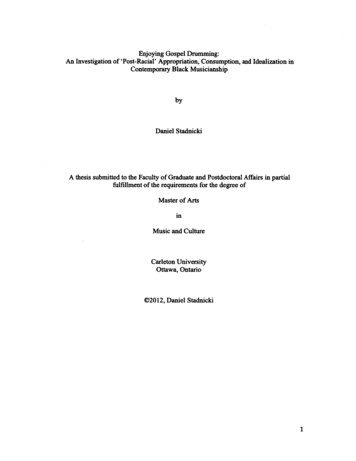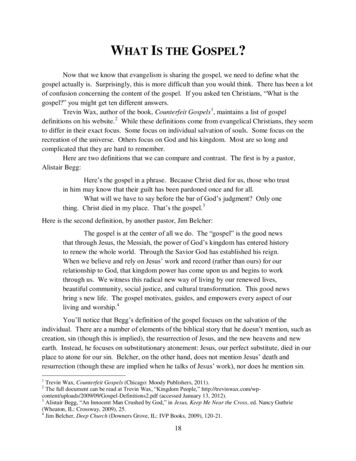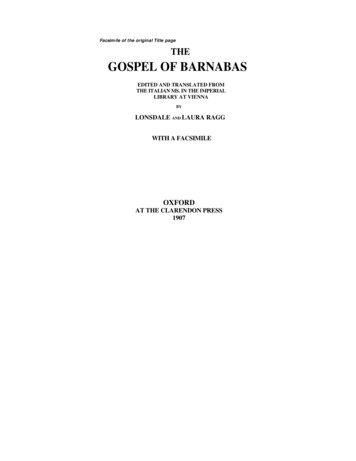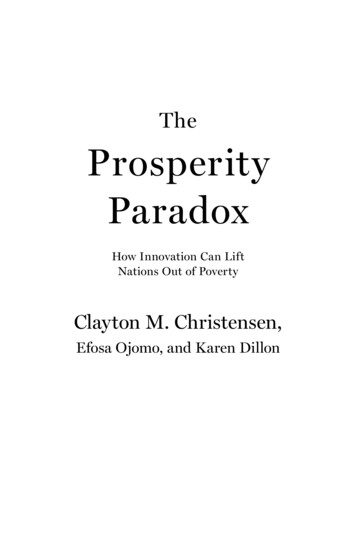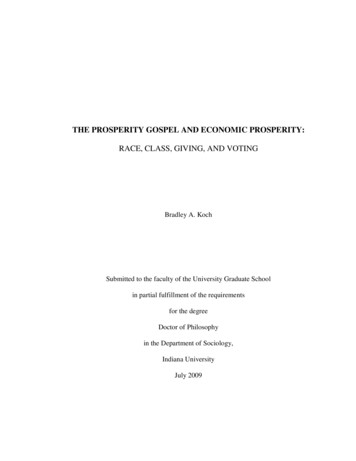
Transcription
THE PROSPERITY GOSPEL AND ECONOMIC PROSPERITY:RACE, CLASS, GIVING, AND VOTINGBradley A. KochSubmitted to the faculty of the University Graduate Schoolin partial fulfillment of the requirementsfor the degreeDoctor of Philosophyin the Department of Sociology,Indiana UniversityJuly 2009
Accepted by the Graduate Faculty, Indiana University, in partial fulfillment of therequirements for the degree of Doctor of Philosophy.Doctoral CommitteeRobert V. Robinson, Ph.D. (chair)William Corsaro, Ph.D.Constance M. Furey, Ph.D.Brian Steensland, Ph.D.July 20, 2009ii
2009Bradley A. KochALL RIGHTS RESERVEDiii
ACKNOWLEDGEMENTSThanks to the Lake Institute on Faith & Giving at the Center on Philanthropy at IndianaUniversity, and Rich Klopp in particular, for the funding that allowed me to write thisdissertation and to the Society for the Scientific Study of Religion for the travel funds topresent an early version of the second chapter of this work at their annual meeting.Thanks to my committee members, Rob Robinson, Bill Corsaro, Connie Furey, and BrianSteensland, for their support and advice. Thanks to my parents, David and VictoriaKoch, and to my wife, Lauren Koch, for their love.iv
ABSTRACTBradley A. KochTHE PROSPERITY GOSPEL AND ECONOMIC PROSPERITY:RACE, CLASS, GIVING, AND VOTINGThe Prosperity Gospel is the doctrine that God wants people to be prosperous, especially financially.Adherents to the Prosperity Gospel believe that wealth is a sign of God’s blessing and the poor are poorbecause of a lack of faith. In this dissertation, I conduct a study of the Prosperity Gospel through logitanalysis of data collected through telephone survey (N 1003) by SRBI for Time magazine. I report findingsin four main areas: (1) there are multiple Gospels of Prosperity, and the Prosperity Gospel istransdenominational; (2) while income has no effect on adherence to the Prosperity Gospel, blacks, the“born-again” or “evangelical,” and those who are less educated are more likely to seek out Prosperitymessages; (3) Prosperity adherence does not affect how much people give financially to either theirchurches and other religious causes or to nonreligious causes; (4) Prosperity adherents vote in about thesame proportions as the rest of the population, and those with a Prosperity orientation tend to have votedfor Bush in the year 2004 and identify as Republican. This project is an example of how future research inthe sociology of religion should acknowledge and take seriously the two dominant theoretical perspectives(i.e. neo-Marxianism and Weberianism) on which the subfield stands. Overall, the Prosperity Gospel is afairly flexible theology that is well-suited to be adapted to varying social locations, particularly in a societylike the United States that is radically individualistic.v
TABLE OF CONTENTSChapter 1 Introduction.1Chapter 2 Race and Class and Prosperity Gospel Adherence.34Chapter 3 Penny-Pinching for Prosperity?.52Chapter 4 Voting for Prosperity.68Chapter 5 Vitavi
CHAPTER 1IntroductionBACKGROUNDThe Prosperity Gospel 1 is the seemingly-transdenominational doctrine that Godwants people to be prosperous, especially financially. Adherents to the Prosperity Gospelbelieve that wealth is a sign of God’s blessing and is compensation for prayer and forgiving beyond the minimum tithe to one’s church, televangelists, or other religiouscauses. The logical extension of the Prosperity Gospel—sometimes explicit, sometimesnot, depending on the preacher—is that the poor are poor because of a lack of faith—thatpoverty is the fault of the poor themselves (Brouwer, Gifford, and Rose 1996; Fee 1985;Gifford 1990; McConnell 1988). Adherents also tend to interpret the New Testament asportraying Jesus as a relatively rich figure who used his wealth to feed the masses onseveral occasions and to finance what they argue to have been a fairly costly itinerateministry. As such, Prosperity adherents argue that we should model our lives after Jesus’by living lavishly, in stark contrast to orthodox interpretations of the Gospels that regardpoverty as a Christian ideal modeled after a poor messiah. In this sense, adherentsbelieve God to be very interested in their financial status. Poverty, far from being ablessing, is a sign of God’s disfavor; thus, Christians have a duty to deal only with theapparent lack of faith among the poor and not their poverty itself. Given these tenets, we1What I am terming the “Prosperity Gospel” has gone by several names, including “The Health and WealthGospel,” “Prosperity Theology,” and the “Law of Reciprocity.” Detractors have called it “Prosperity Lite”and “The Gospel of Greed” (van Biema and Chu 2006). I use the label “Prosperity Gospel” because it isthe most often used among those who are part of the movement.1
would expect there to be some relationship between Prosperity adherence and class, race,and charitable giving.A BRIEF HISTORYMcCloud (2007) identifies four recurring theologies of class in Americanreligious history. He labels these “divine hierarchies,” “economic Arminianism,” “socialharmony,” and “the class-conscious Christ.” McCloud defines them in the followingway:The first, which I call ‘divine hierarchies,’ is closely tied to Calvinist predestination and suggeststhat socioeconomic differences are divinely ordained. The second, ‘economic Arminianism,’emerges amidst nineteenth-century Evangelicalism, Republicanism, and the development ofindustrial class relations. Asserting that all human beings have the free will to progress in bothreligious and financial endeavors, economic Arminianism is the most dominant class theologytoday and can be seen in movements as variant as the prosperity gospel and New Age channeling.The third recurring theology, ‘social harmony,’ was represented in many Protestant Social Gospelwritings as well as a Roman Catholic statement on labor and capital, Pop Leo XIII’s RerumNovarum. With roots in antebellum notions of the ideal society as a ‘harmony of interest’ amongdifferentiated unequals, proponents of this class theology argued that laborers and capitalistowners in the emerging industrial economy shared mutual, rather than opposing, interests andgoals. While some criticized the Gilded Age robber barons for their exploitative practices,adherents to this view consistently upheld capitalism, private property, and profits as biblicallysanctioned. The fourth theology, ‘the class-conscious Christ,’ took a rather different view.Espoused by some Gilded Age supporters of the working class, this theology envisioned Jesus aschampion of laborers and enemy of capitalism. Rather than a harmony of interests, proponents ofthe class-conscious Christ viewed labor and capital relations as inherently conflictual. At times,they even envisioned such conflict as a literal battle between good and evil (105-6).2
The Gospel of Wealth falls under the first theology, divine hierarchies. This lineof thinking was perhaps best summarized by Andrew Carnegie in his essay “Wealth”(1889): [T]he man of wealth thus becoming the mere agent and trustee for his poorer brethren, bringingto their service his superior wisdom, experience, and ability to administer, doing for them betterthan they would or could do for themselves .It were better for mankind that the millions of therich were thrown into the sea than so spent as to encourage the slothful, the drunken, the unworthy(662).The Gospel of Wealth offered a conservative Protestant argument against unmitigatedcharitable giving. To the industrialists of the Gilded Age, like Carnegie, the poor wereincapable of managing wealth on their own and required the assistance of an elite class ofadministrators who could best help those of lower classes by eliciting functionalisticbehavior through calculated social investment. This sentiment is perhaps best captured inthe Chinese proverb, “Give a man a fish and you feed him for a day. Teach a man to fishand you feed him for a lifetime.” Marsden (1972) argues that the Gospel of Wealth andWeber’s Spirit of Capitalism are, in fact, one in the same in that both espouse aneconomic individualism that requires a particular work ethic. The Gospel of Wealth isthe first modern apology for the mass accumulation of capital, unsurprisingly coming outof the second wave of the Industrial Revolution and being espoused by the Americanrobber-barons of the late-nineteenth century.Through the Social Gospel, part of the social harmony theology, progressiveProtestants argued that Christians had a moral obligation to improve the lot of the poorspiritually and materially. Three major successes of the movement included the missionof the Salvation Army (Davis and Robinson 1999), the election of Franklin Delano3
Roosevelt, and the subsequent implementation of his New Deal, and the success of theYMCA, established as a place for immigrants to acclimate themselves to a new culture.Unlike the Gospel of Wealth and the Social Gospel which were deterministic, topdown, and only marginally religious treatments of poverty, the contemporaneous originsof what would be called the Prosperity Gospel, economic Arminianism par excellence,offered a much more agential, bottom-up, and magico-religious solution for the poor.The roots of the Prosperity Gospel lie ultimately, as does all of EvangelicalProtestantism, in the “Great Awakenings” of the eighteenth and nineteenth centuries(Robbins 2004). Evangelical Protestantism refers to those denominations andindependent congregations that have historically placed emphasis on proselytization,“born-again” experiences, and biblical authority. The Holiness movement emerged nearthe end of the third wave of these awakenings, around 1900. Holiness was largely anextension of Methodism and argued that there was more to the early-Christian messagethan salvation. Preachers like Charles Fox Parham taught that, in addition to forgiveness,individuals were in need of “entire sanctification” initiated by the Holy Spirit (Harrell1975:12). William Seymour, the son of former slaves and a student of Parham’s, movedto Los Angeles in 1906, opening a ministry in an abandoned African Methodist EpiscopalChurch on Azusa Street. While there were several similar ministries in other parts of theU.S. at the time, many in academia (e.g. Cox 1993; Freston 1995; Robbins 2004) and inthe movement itself mark the Azusa Street revival as the birth of the modern Pentecostalmovement. Pentecostalism included those denominations and independent congregationsthat extended the Holiness claim to sanctification even further, arguing that individualsare in need of a “baptism of the Holy Spirit.” As evidence of this spiritual baptism,4
adherents looked for signs, including the gifts of prophecy, healing, and, most notably,tongues. By the 1920s, numerous sects were congealing around the doctrine of baptismby the Holy Spirit and the resulting glossolalia into the more familiar Pentecostaldenominations (e.g. Assemblies of God, Church of God in Christ, Church of God[Cleveland]).The 1940s and 1950s witnessed a movement of itinerant Pentecostal preachers,most of whom emphasized the gift of healing. The relationship, however, between thePentecostal denominations and these ministries was tenuous at best (Harrell 1975).Denominations like the Assemblies of God were struggling to gain acceptance amongmainstream American society, having been largely ridiculed since their inception asbeing overly-emotional, low-brow, and even farcical. While the Pentecostaldenominations did not necessarily disagree with the healing preachers on a theologicallevel, they felt the need to distance themselves from the controversy and scandal thatfollowed all of the tent revivals. As many Americans sought increasing sophistication intheir religious expression in the years following the Second World War (cf. Wuthnow1988), these healing ministries began to falter, and all but a few disappeared.By the 1960s, what came to be known as the Charismatic (or neo-Pentecostal)Movement emerged from these fledgling denominations (Harrell 1975). Charismatics,like Pentecostals, emphasized spiritual baptism and glossolalia. In 1960, the Episcopalpriest Dennis Bennett announced to his congregation that he had been baptized in theSpirit. The following years saw similar infiltration into other Mainline and Evangelicaldenominations. In 1967, a group of students at Duquesne University received the gift oftongues, marking the spread of the movement into Roman Catholicism. By the early-5
1970s, there were virtually no religious institutions untouched by the CharismaticMovement (Harrell 1975), and it was well on its way to becoming a global movement(Coleman 1993; 2000; Eves 2003; Jenkins 2002; Poewe 1994).During this time of Charismatic revival, a new breed of semi-independentpreachers with loose or recently-severed affiliation with the Pentecostal denominationsgained popularity. Unlike their predecessors, who focused almost exclusively on the giftof healing, most moderated the extremism of the healing message and expanded theirministry to include new themes such as prosperity. The first formulation of divineprosperity came from Oral Roberts. As early as 1954, he was telling followers to expecta sevenfold return on their contributions to his ministry as a reward from God (Harrell1975). It is out of this “new breed” of Charismatic preachers that the Faith Movement,with its gospel of prosperity, took form.The Faith Movement is comprised of the largely independent ministries of thosewho teach the centrality of positive confession and the doctrines of healing andprosperity. What I am terming the “Faith Movement” has gone by several names,including “Word,” “Word of Faith,” “Word-Faith,” “Name It and Claim It,” and “Healthand Wealth.” I choose “Faith Movement” because, like the term Prosperity Gospel, it isboth the most often used among those who are part of the movement and the leastpejorative of the alternatives. The father of this movement was Kenneth Hagin, whoseministry was thriving by the 1970s. The early Faith Movement was comprised of severalteachers who tended to agree on the central importance of three basic doctrines: positiveconfession, healing, and prosperity (Barron 1987; Bruce 1990b; Hollinger 1991).Positive confession requires that adherents not merely hope that they receive the gifts that6
God promises but have absolute confidence that they have already received them. Muchof this doctrine relies on specific “magic” formulations that include “loosing” things likewealth or healing or “binding” evil that would block such blessings (Hunt 1998).Positive confession can be used to invoke the second and third doctrines—healing andprosperity.The Faith Movement and its Prosperity Gospel is alive and well today. KennethHagin, Jr. has taken over his father’s ministry and has proclaimed Kenneth Copeland andJohn Osteen—late father to the best-selling prosperity author, megachurch pastor, andtelevangelist Joel Osteen—as students of his father (Barron 1987). Copeland’s messageis unapologetically prosperity-centered, and his publications are almost all devoted to thistopic (e.g. Copeland 1974). While Joel Osteen claims, “I’m not a prosperity preacher”(King 2006), and “I don't think I’ve ever preached a sermon about money” (van Biemaand Chu 2006:53), he writes in his book Your Best Life Now: 7 Steps to Living at YourFull Potential, “God wants to increase you financially ” (5) and “the only place in theBible [Malachi 3:10-12] where God tells us to prove him—which means to test Him, orcheck Him out—is in the area of our finances” (his emphasis) (257). He also writes:If you will dare to take a step of faith and start honoring God in your finances [by tithing], He’llstart increasing your supply in supernatural ways. God will take that 90 percent you have leftover, and He’ll cause it to go further than the 100 percent with which you started. The Scripturesays that when we tithe, God not only opens up the windows of heaven, but He will rebuke thedevourer for your sake. That means He’ll keep the enemy off your money, off your crop, off yourchildren, and away from your home. He’ll make sure you get promoted. He’ll cause you to getthe best deals in life. Sometimes, He’ll keep you from sickness, accidents, and harm that mightcause other unnecessary expenses. All kinds of blessings come your way when you honor God inthe area of your finances (256).7
Joel Osteen is, however, the most mainstream and moderate voice in the movementtoday, even to the extent of being listed as one of “The 10 Most Fascinating People of2006” by ABC News (Walters 2006). He rarely, if ever, speaks about sin and death andchooses not to address such contentious issues as homosexuality and abortion. In fact,his teachings, along with those of similar preachers such as Joyce Meyer, are oftenreferred to as “Christianity Lite” since they avoid the tough but traditional teachings oforthodox Christianity and are closely associated with the secular self-help movement. 2The Faith Movement was the source and incubator for the Prosperity Gospel,which originated in the movement, and is at the core of its theology, serving as one of itsthree central doctrines. These three main teachings of the Faith Movement are divinehealing, prosperity, and positive confession (Barron 1987). Physical healing andfinancial prosperity are seen as biblical promises from God to the faithful. In order for abeliever to reap these benefits, one need only “positively confesses” his or her faith inthat contract of health and wealth through the spoken word. Estimated to have over 16million adherents in the U.S. alone, the Prosperity Gospel seems to have reached beyondits denominational boundaries, much as the Charismatic Movement did earlier. In fact, itis likely that the Prosperity Gospel owes its success to the broad, transdenominationalappeal of the Charismatic Movement (Barron 1987; Coleman 2000; Harrell 1975). WhileOsteen and Copeland have direct ties to the independent Faith Movement, there are othersomewhat surprising advocates. For example, Kirbyjon Caldwell preaches the ProsperityGospel at Windsor Village United Methodist Church to the largest United Methodistcongregation in the country, with 15,000 members (van Biema and Chu 2006). Even2In fact, Prosperity proponents universally admit that the principles they set forth work for Christians andnon-Christians alike (see Copeland 1974).8
though the United Methodist Church has been called the “church of the large standarddeviation” because it encompasses such a diversity of beliefs (Green and Guth 1998:78),it is surprising to find such heterodox teaching in a solidly Mainline Protestantdenomination.Such evidence of unbounded expansion could possibly be explained byWuthnow’s (1988) declining denominationalism thesis which posits that, given thewidespread institutional changes that followed WWII, religious denominationsunderwent similar changes as well. The cautious optimism of the post-War years, alongwith the accompanying economic upswing so unimaginable in the preceding twentyyears, set the stage for broad changes in the religious landscape. These changes can beseen, according to Wuthnow, in two specific places. First, denominational divisions areno longer as significant as they were before the War. A convergence in the levels ofeducation between denominations is the hypothesized driving force of this phenomenon.Second, while denominational differences are declining, transdenominational specialpurpose groups, including those that tout the Prosperity Gospel, are proliferating. Thesegroups are increasingly polarized along theo-political lines: highly-educated liberals vs.less well-educated evangelically-inclined conservatives. This discussion is situated in anongoing debate about the culture war (see Ammerman 1990; Davis and Robinson 1996;Hunter 1991). This trend was motivated mostly by the federal government’s growinginfluence on what were previously local and private issues as well as the resultantemergence of a strong national identity. Contradictory evidence, suggesting that theProsperity Gospel has been largely confined to Evangelical and Black Protestant circles,9
would suggest a more rigid social structure in which both class and ideologicaldifferences parallel denominational divisions, as predicted by Niebuhr (1957).Many scholars of religion (Cox 2001; Elinson 1965; Gifford 1990; Harrell 1975;Hollinger 1991) argue that the Prosperity Gospel resonates only with those of the lowerclass by offering them the “opiate” of upward mobility. Others make the reverseargument that the Prosperity Gospel actually rationalizes the wealth of those who havebeen upwardly mobile by saying that this is spiritually derived and deserved (Bruce1990b; Fee 1981; Gifford 1998). Heelas (1993) argues that New Age conceptions ofprosperity (see Brown 1999), which many (Barron 1987; Crenshaw 1994; Fee 1985;Hollinger 1991; McConnell 1988) see as having influenced the Prosperity Gospel, are anaccommodation to modernity in that they equate “success in the marketplace” with“spiritual progress” (Heelas 1993:107) and are “aligned with the mainstream goals andvalues” of modernity (108). Hunt, Hamilton, and Walter (1997) note “a tendency forneo-Pentecostalism to endorse certain modern trends,” with the Faith Movement inparticular being motivated by “instrumental rationalism” (9). Walker (1997) writes:At the very least Pentecostalism throughout the world has not only provided meaning and succorto its adherents but it has also equipped many of them with the values of ascetic Protestantism souseful to the modern enterprise, and so essential for social mobility in a capitalist economy (36).These assumptions are speculative and, until now, have largely gone untested. Othershave gone still further, suggesting that Pentecostal beliefs, including those in prosperity,could even facilitate upward mobility. Martin (1990) argues that the sense ofindividualism imparted by Pentecostalism equips both individuals and cultures forcapitalistic development. Annis (1987) argues that Guatemalan Protestant missionaries,particularly Pentecostals, attack an indigenous culture that they see as reinforcing10
structural inequalities by equipping converts with a new set of values and behaviors moreconducive to upward mobility (e.g. investing in service-oriented business overagricultural). Similarly, Woodberry (2006) suggests that “Pentecostalism may facilitatemovement of poor people into the middle class” (35). My dissertation research will testthe conjectures about the class location, race, and giving habits of Prosperity adherents inthe U.S.THEORYThe Dialectics and Causality of ClassTo understand the relationship between the Prosperity Gospel and social class, wemust situate this question within the broader debate about religion and economy withinsociology. Sociological investigation of the relationship between religion and class cangenerally be divided into two historical-theoretical camps: those treating religionprimarily as a dependent variable and those treating it mainly as an independent variable.The roots of this theoretical divide can be traced back to two of the three foundingparents of sociology itself: Marx treated religion as a dependent variable while Webertreated it primarily as an independent variable. The two schools of thought draw theircausal arrows in opposite directions. At the risk of oversimplifying two complexperspectives, it can be said that Marxians tend to see economics as affecting religion,while Weberians tend to see religion as affecting economics.Marx’s theory of class conflict is rooted in philosophical materialism. That is tosay that Marx (1978 [1844]) believed that material existence, especially one’s economicsituation, was the independent variable of utmost importance in predicting any dependent11
variable. Religion was no exception. While Marx’s theory was underdeveloped withregard to religion, largely because religion itself was ill-defined in his theory (Saxton2006), he did leave us with some memorable words on the subject (Marx 1978 [1844]):Religious suffering is at the same time an expression of real suffering and a protest against realsuffering. Religion is the sigh of the oppressed creature, the sentiment of a heartless world, andthe soul of soulless conditions. It is the opium of the people (54).Marx thought that religion was something that could be explained in terms of sufferingand oppression, two attributes he linked to a specific social class: the proletariat (Marxand Engels 1992 [1888]). While Marx left religion rather undeveloped in his theory,others took up the study of religion in Marxian fashion. Writing about the sources ofdenominationalism or schism in religion, Niebuhr (1957) observed:One phase of denominationalism is largely explicable by means of a modified economicinterpretation of religious history; for the divisions of the church have been occasioned morefrequently by the direct and indirect operation of economic factors than by the influence of anyother major interest of man (26).While Niebuhr was not dismissive of the divisive nature of theological differences, it isclear that he thought that it was primarily economic conditions that predisposed areligious community to these. For other examples of research that treats religionprimarily as a dependent variable, see Bourdieu (1991), Boyer and Nissenbaum (1974),Engels (2000 [1870]), Schoenfeld (1992), and Wuthnow (1980; 1988).Weber’s thesis, unlike Marx’s, is rooted in idealism. That is to say that Weberbelieved that ideas—not matter—were the a priori stuff on which all else depended.Weber (1946 [1915]) tells us, “ [V]ery frequently the ‘world images’ that have beencreated by ‘ideas’ have, like switchmen, determined the tracks along which action hasbeen pushed by the dynamic of interest” (280). While Weber acknowledges that religion12
can also be a dependent variable, he devotes most of his attention to religion as anindependent variable. In short, the flux of ideas, especially theology, was the independentvariable of utmost importance in predicting a given dependent variable. In TheProtestant Ethic and the Spirit of Capitalism, Weber (1992 [1920]) attempts to show thatCalvinism led to the development of modern capitalism, or at least to its driving “spirit.”Calvinism tells us that only some are going to Heaven; God already knows who thosepeople are; accumulating wealth is a sign that one is going to Heaven; by working hard,one has the chance of accumulating wealth; however, one should never carelessly spendthis wealth since this would increase pride which is a sin against God; when one beginssaving, one can begin to invest; and, finally, investment of capital is essentiallycapitalism. In short, Calvinism, particularly the teachings of predestination and worldlyasceticism, created capitalism as we know it, according to Weber. Weber clearly thoughtthat religion was something that could explain the emergence of a specific social class ofinvestors: the bourgeoisie. There are, of course, more contemporary examples ofWeberian research within sociology. Gerhard Lenski (1961) analyzed his 1958 survey ofDetroit-area residents by first asking whether religion affected their secular lives. Hefound Marxian claims “untenable” (132) and that, indeed, religion does affect the secularin terms of attitudes and practices economically, politically, in the family, and ineducation and science, supporting Weber. In doing so, he assumed that religion is bestused as an independent variable. For other examples of sociological research that usereligion as an independent variable, see Barro and McCleary (2003), Davis and Robinson(1996; 1999; 2006), Erikson (2005), Hart (1996), Marx (1967), Meyer and Rowan(1977), Nelson (1993), Noll (2002), Regnerus, Smith, and Sikkink (1998), Sherkat and13
Blocker (1994), Sherkat and Ellison (1997), Smith (1991), and Wuthnow (1994).It is important not to exaggerate the polarization of these two schools of thought.Peter Berger (1990) attempts to draw a middle ground between Marxian materialism andWeberian idealism, namely, dialecticism. By describing the relationship betweenreligion and class as dialectical, Berger attempts to replace the either/or relationshipbetween these two camps with a both/and understanding:The dialectical relationship between religion and society thus precludes the doctrinaire approachesof either “idealism” or “materialism.” Only a dialectical understanding of these relationshipsavoids the distortions of the one-sidedly “idealist” and “materialist” interpretations (128).The divergent arrows of causality are more accurately, according to Berger, two sides ofa reciprocal relationship.In my dissertation, I will conduct a study of the case of the Prosperity Gospel andhow religion and class are related among its adherents. The Prosperity Gospel is wellsuited to investigating linkages between religion and class/economics: the key tenets ofthis gospel include beliefs about wealth, poverty, God’s rewarding or punishing peo
apparent lack of faith among the poor and not their poverty itself. Given these tenets, we 1 What I am terming the “Prosperity Gospel” has gone by several names, including “The Health and Wealth Gospel,” “Prosperity Theology,” and the “Law of
